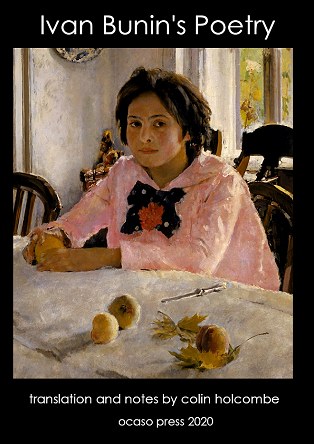Ivan Bunin is better known for his short stories, but wrote poetry throughout his long working life. The poetry is quiet and unassuming, but was sufficient to win Bunin the Pushkin Prize in Russia on three occasions, and contribute to the Nobel Prize for Literature, awarded in 1933, when Bunin was an emigré writer domiciled in France.

Bunin poems are still popular with Russians, but not well known outside the country. Unlike his prose, Bunin's verse is exceptionally quiet, impersonal and unassuming. His long working life spanned the Silver Age of Russian poetry in its entirety. He knew the Symbolist poets (Aleksandr Blok, Andrei Bely and Vyacheslav Ivanov).
He read the great poets of Acmeism (Anna Akhmatovna and Ossip Mandelstam ) and of Futurism (Aleksei Kruchenykh, Velimir Khlebnikov and Vladimir Mayakovsky). Even as an emigre poet he would have been aware of Boris Pasternak and Marina Tsvetaeva, both producing linguistically brilliant, challenging and emotively compelling work.
But Bunin remained studiously unaffected by all such movements. His poetry shows the influence of Symbolism and Acmeism occasionally, but not markedly so. He knew its celebrated poets personally, and was respected in his turn, but Bunin simply produced collections of very conventional poems on very conventional themes. The personal element is not so much missing as muted, only hinted at in the ironic phrase or reflection, as is the case in his prose works. Many of the poems do indeed anticipate the short stories, but the affection for all things Russian has yet to become an overwhelming nostalgia. Bunin poems have an encompassing love of humanity, but also a stern eye for realism, and Bunin thus had little of Gorky's idealism of the common man, or Blok's unrealistic hopes of the Revolution. As his social world collapsed, first in Russia, and then in the Nazi takeover of France, he increasingly adhered to the traditionalist view, that poems give enduring life to what is only particular and evanescent.
The poems seem very conventional, quite unlike those of
more celebrated writers in Russia's Silver Age, but the pieces are very
accomplished and have weathered well: many indeed anticipate the
approaches of
western Modernist poets.
Poetry for Bunin required application, observation and detachment. Each poem was a separate conception, therefore, born of what its author felt and saw at that particular moment, and not the product of a sustained reflection on intellectualised themes, as Modernist work tends to be. Bunin was thus a very traditional poet, indeed reactionary in later years. A poet in Bunin's view does not create from sustained imagination, but must fuse sense impressions and craft to produce aesthetic entities that reconcile us to our existence as it generally is, fragmentary and in the end unsatisfactory, but still mysteriously life-enhancing.
The free pdf ebook translates fifty of Bunin's most representative
pieces. Each is given with facing Russian text, and the ebook includes
an extensive Appendix
providing literal and prosodic renderings, links to critical articles
and audio recordings, and important references.
A free Bunin Poems e-book in pdf format.
The forest, a towering, painted wall
of purple, gold and crimson shade
rejoices in the sunlight’s fall
from heights into this brilliant glade.
5. The birch-tree shavings, yellow-white,
thin-glimmer in the azure light,
while tall, dark firs that soar on through
the gaps in maples fade to blue.
In places through the foliage shine
10. odd widows where the sky has won.
The forest smells of oak and pine,
of summers dried out in the sun.
Now autumn, in her sadder shows,
adopts the widow’s quieter clothes.
15. Today, athwart the light, is laid
across an empty courtyard space,
the spider’s web of silver braid
that was an aerial net of lace.
About the yard, throughout the day,
20. the last moth flutters, then is still,
when, like a petal in the chill
of winter, in the web will stay.
But in the sun great warmth is found,
as from the splendour all around.
25. But also silence in the light
that falls from blue and forest height.
What does this close, thick silence hold
that we can hear a leaf unfold?
The forest, a towering, painted wall
30. of purple, gold and crimson shade.
Across this simple, happy glade,
and spell-bound by the silence made,
a blackbird calls and seems to fly
from where the thickest shadows lie.
35. Deep amber gleams the foliage there,
but scattered through the heaven’s air,
wide, scattered flocks of starlings press:
then all is still, as though aware
of this last flood of happiness.
40. So autumn knows its settled lease,
accepting deep and thoughtful peace.